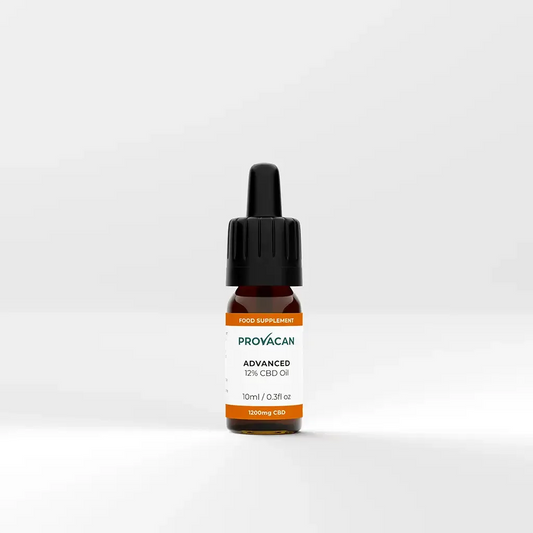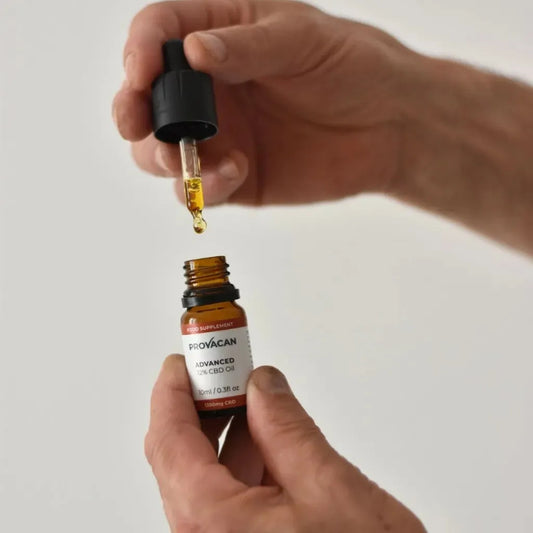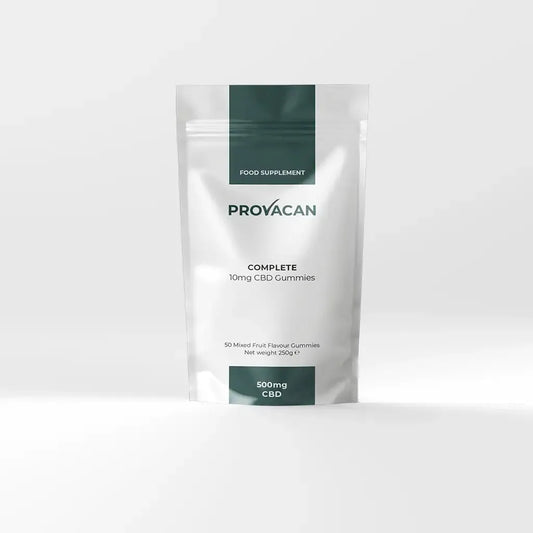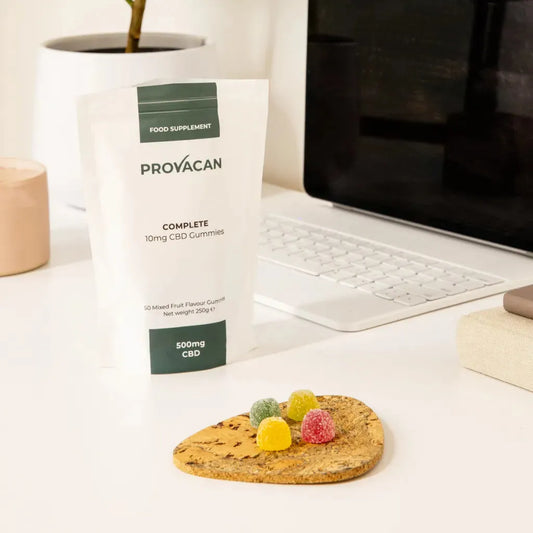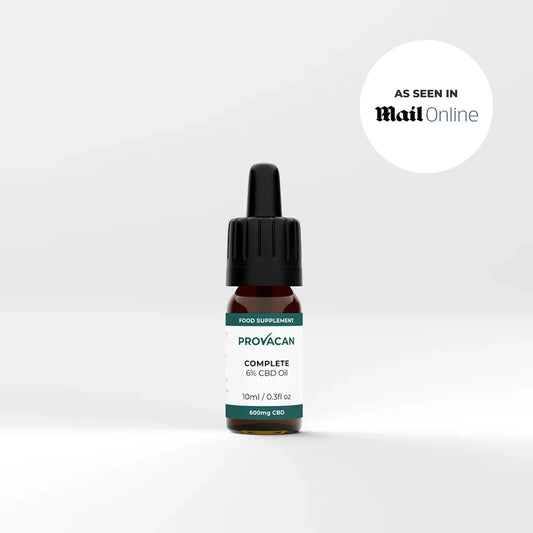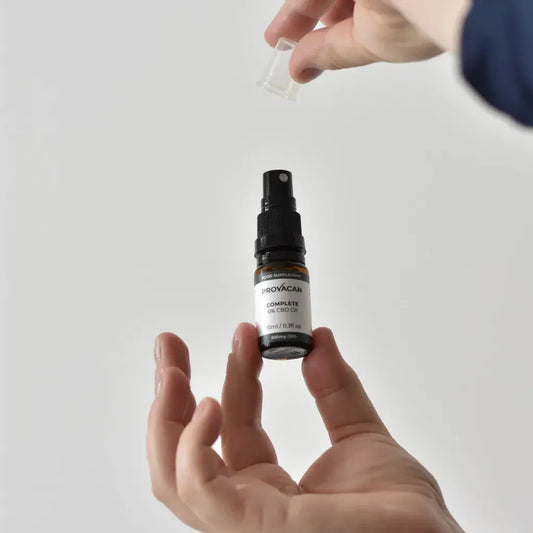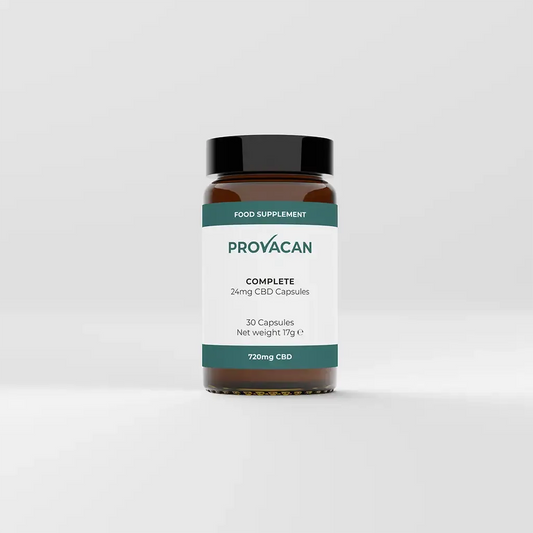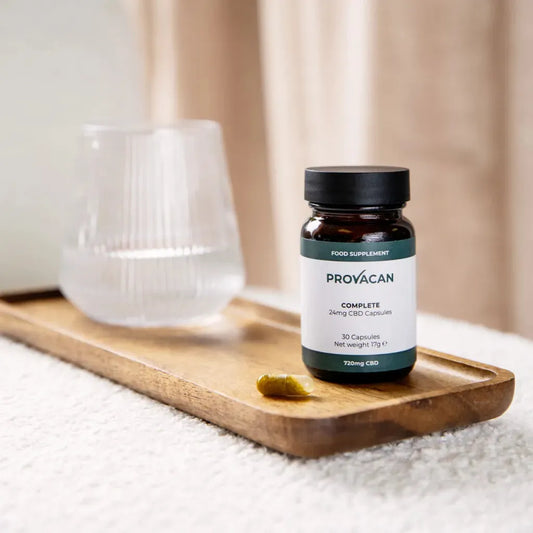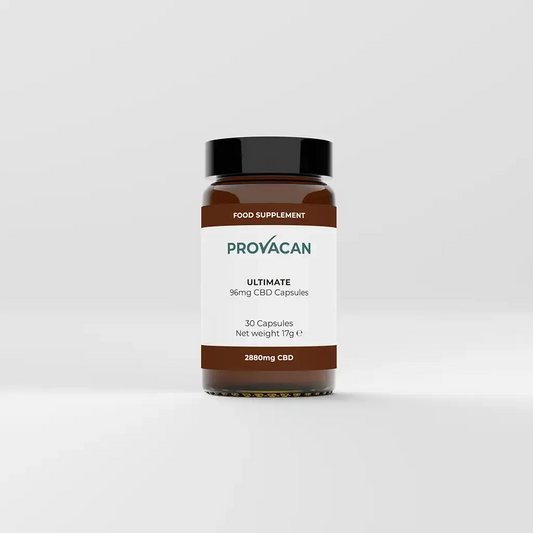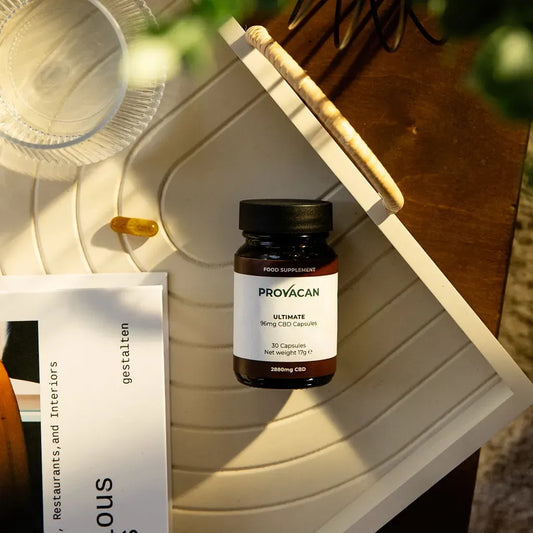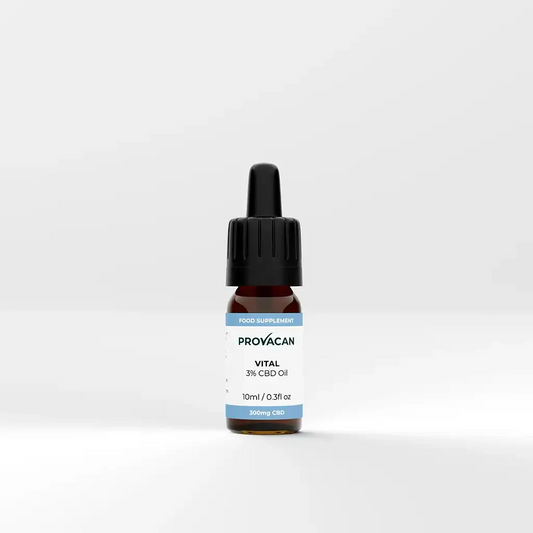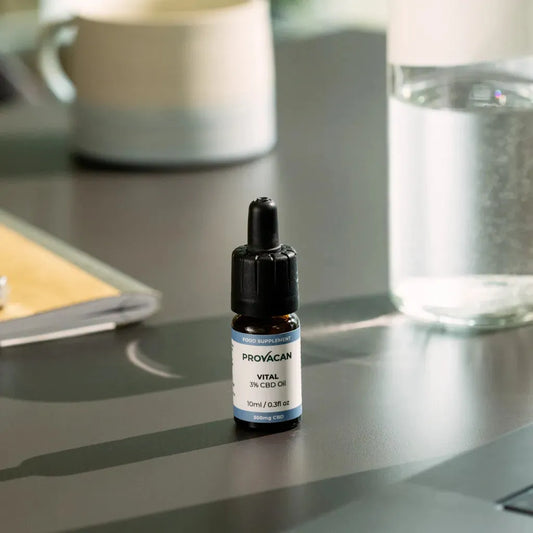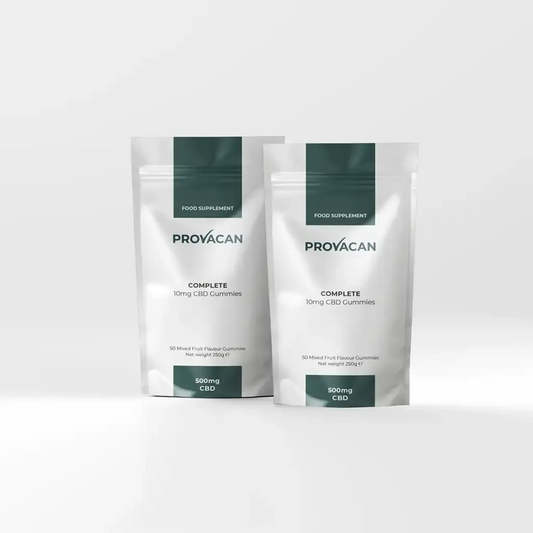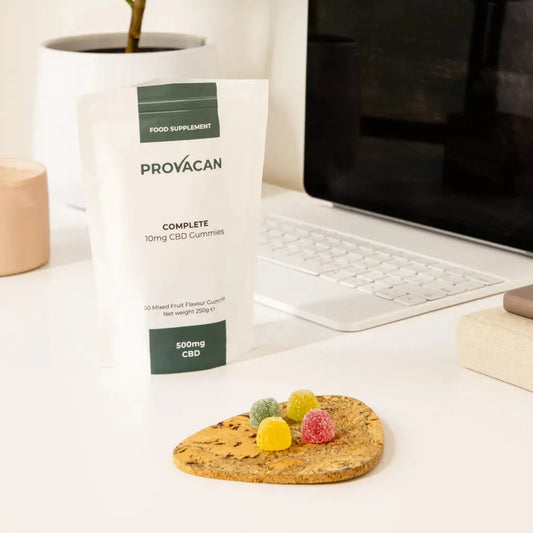Collection: CBD For IBS
Irritable Bowel Syndrome, or IBS, is a chronic condition that affects millions of people worldwide. IBS causes a variety of painful symptoms that can also have a direct impact on sufferers’ quality of life. There is no cure for IBS, though there are many treatment options that can help to manage the symptoms of this debilitating condition. Many involve medications that can cause even more side effects.
-
Book your free consultation
Get expert guidance on natural ways to support sleep, stress, and more.
BOOK NOW
-
Provacan Advanced CBD Oil | 1200mg / 12% CBD, 10ml
4.7 / 5.0
(213) 213 total reviews
Regular price £49.99 GBPRegular priceUnit price / per -
Provacan Complete CBD Gummies 50 Pack | 10mg CBD per gummy
4.7 / 5.0
(187) 187 total reviews
Regular price £22.99 GBPRegular priceUnit price / per -
Provacan Complete CBD Oil | 600mg / 6% CBD, 10ml
4.7 / 5.0
(194) 194 total reviews
Regular price £34.99 GBPRegular priceUnit price / per -
Provacan Complete CBD Capsules | 24mg CBD per capsule, 30 Pack
4.6 / 5.0
(166) 166 total reviews
Regular price £34.99 GBPRegular priceUnit price / per -
Provacan Ultimate CBD Capsules | 96mg CBD per capsule, 30 Pack
4.6 / 5.0
(70) 70 total reviews
Regular price £89.99 GBPRegular priceUnit price / per -
Provacan Vital CBD Oil | 300mg / 3% CBD, 10ml
4.6 / 5.0
(124) 124 total reviews
Regular price £24.99 GBPRegular priceUnit price / per -
Provacan Complete CBD Gummies 100 Pack | 10mg CBD per gummy
Regular price £39.99 GBPRegular priceUnit price / per£45.98 GBPSale price £39.99 GBPSale
Key Takeaways:
- CBD May Help With IBS Symptoms: CBD shows promise in alleviating IBS symptoms such as abdominal pain, inflammation, and irregular bowel movements, through its interaction with the endocannabinoid system.
- Consider the Different Forms of CBD: Various CBD forms, including oils, capsules, and edibles, offer tailored solutions for diverse lifestyles and preferences, each targeting specific needs related to IBS management.
- Provacan Delivers Highly Effective CBD Products: Backed by scientific research, Provacan's high-quality CBD products focus on purity and potency, providing a potentially effective and natural alternative to traditional IBS treatments.
Understanding IBS: Symptoms And Challenges
Irritable Bowel Syndrome (IBS) is a common digestive disorder affecting millions worldwide, characterized by a collection of symptoms that can significantly impact quality of life. The main symptoms associated with IBS include abdominal pain, bloating, and altered bowel habits, which can manifest as either chronic diarrhoea (IBS-D), constipation (IBS-C), or a combination of both (IBS-M).
The challenges faced by individuals with IBS are multifaceted. Firstly, the symptoms themselves can be debilitating, leading to discomfort and distress that disrupts daily activities. The unpredictability of flare-ups contributes to the stress experienced by those affected, often exacerbating their symptoms further. Moreover, the exact cause of IBS remains unknown, though it is believed to be a complex interplay of intestinal sensitivity, communication issues between the brain and the gut, and environmental factors, including diet.
Social challenges are also significant with IBS. The disorder can carry a stigma that discourages people from seeking help or sharing their experiences. Additionally, symptoms like bloating and gas can lead to embarrassing situations, further intensifying the anxiety that many individuals with IBS already endure.
These symptoms and challenges highlight why effective management strategies are crucial for improving the quality of life for those living with IBS. Each individual’s experience with IBS is different, necessitating a personalized approach to treatment that may involve dietary changes, lifestyle adjustments, and the incorporation of therapeutic products such as CBD to manage symptoms. Such an approach aims at not only reducing the physical discomfort associated with IBS but also addressing the psychological impacts, helping individuals regain control over their health and wellbeing.
Potential Benefits Of CBD for IBS
Irritable Bowel Syndrome affects the large intestine, causing symptoms like cramping, abdominal pain, bloating, gas, and diarrhoea or constipation. Conventional treatments often focus on symptom management, but many are turning to cannabidiol (CBD) as a holistic alternative. Here's a look at how CBD might offer relief for those struggling with IBS.
Anti-Inflammatory Properties
Research suggests that inflammation plays a significant role in IBS. CBD has been recognised for its anti-inflammatory properties. It interacts with the endocannabinoid system in our bodies, particularly affecting the CB2 receptors, which are predominantly found in the gut. By influencing these receptors, CBD may help reduce gastrointestinal inflammation, potentially alleviating some of the discomfort and symptoms associated with IBS.
Pain Relief
CBD is well-known for its analgesic properties. For IBS sufferers, this can be particularly beneficial. The pain associated with IBS often stems from muscle contractions in the intestine and abdominal region. CBD may help reduce this pain by preventing the neurotransmitters from sending pain signals to the brain, offering a natural form of pain relief without the side effects commonly associated with traditional pain medications.
Regulation Of Bowel Movements
Fluctuations between constipation and diarrhoea are common in IBS patients. CBD has shown potential in moderating these symptoms by interacting with the endocannabinoid system, which plays a pivotal role in the motility—or movement—of the gut. By improving gut motility, CBD may help normalise bowel movements, providing relief from both constipation and the urgency associated with diarrhoea.
Stress Reduction
Stress and anxiety can exacerbate IBS symptoms. CBD has been noted for its anxiolytic effects, which can help calm the nervous system. Reducing stress levels may not only improve overall wellbeing but also help manage the triggers that can cause IBS flare-ups. For many, the use of CBD as a stress reliever can be a dual-beneficial approach to managing IBS symptoms.
Enhancement Of Gut Health
Emerging research continues to explore the relationship between the gut microbiome and IBS. CBD’s potential ability to influence gut health and facilitate a balance of healthy bacteria in the gut could pave the way for broader therapeutic options for IBS sufferers, aiming for overall improved digestive health.
It's important to note that while the potential benefits of CBD for IBS are supported by both anecdotal and early scientific research, comprehensive clinical studies are still needed to concretely establish its effectiveness. As with any supplement or treatment, it’s advisable to consult with a healthcare provider before starting the use of CBD, especially for conditions like IBS.
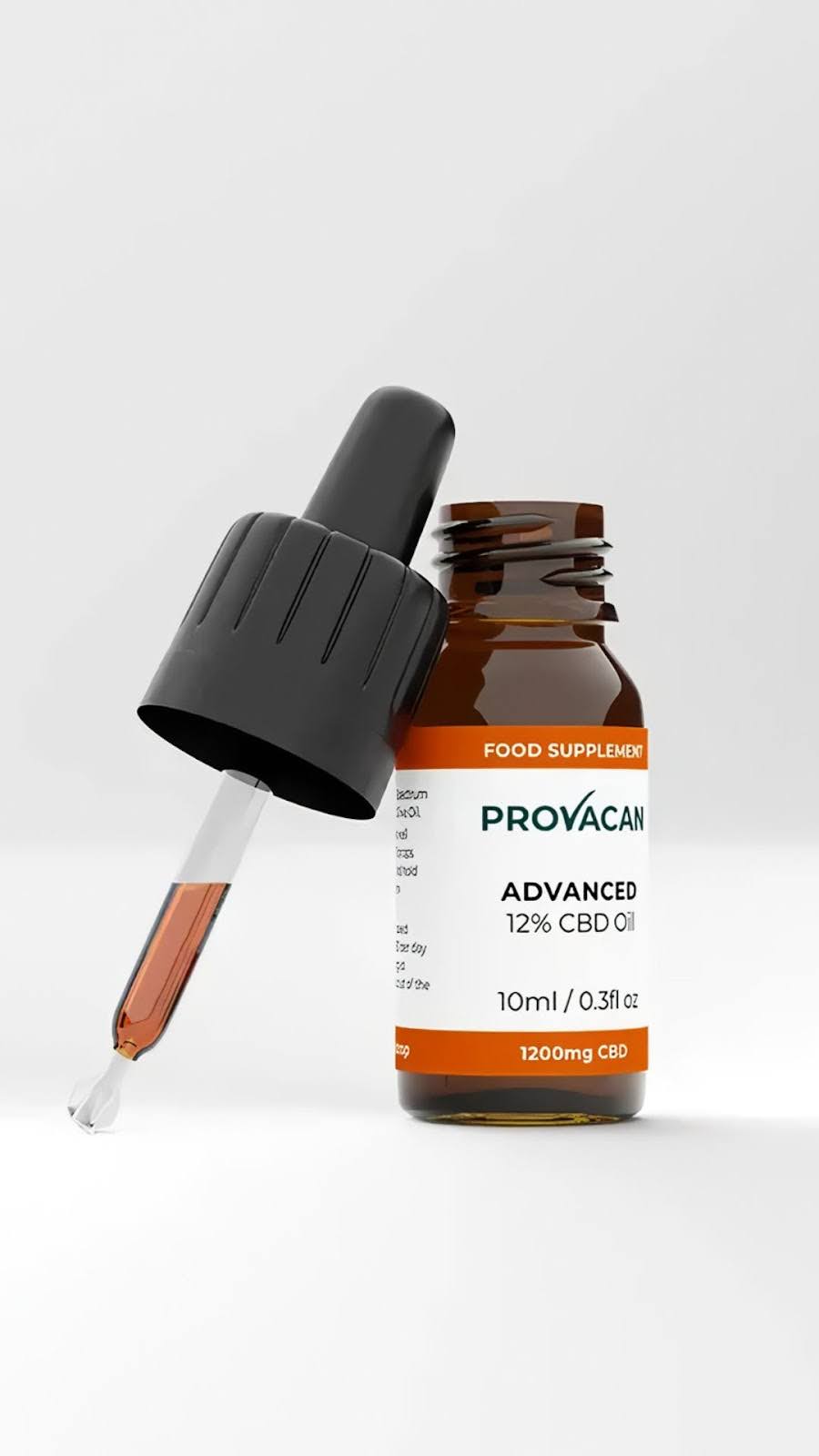
Different Forms Of CBD: Oils, Capsules, Edibles, And More
When considering CBD for IBS management, choosing the right form for your lifestyle and medical needs is crucial. CBD is available in various formulations, each offering unique benefits and methods of consumption.
CBD Oils
CBD oils are highly popular due to their versatility and ease of use. They can be administered sublingually (under the tongue), which allows for quick absorption into the bloodstream. Provacan’s CBD oils are crafted with precision, ensuring each drop delivers a consistent concentration of CBD. This form is ideal for those seeking rapid effects and easy dosage control.
CBD Capsules
For those who prefer a more conventional approach, CBD capsules provide a straightforward solution. Each capsule contains a precise dosage, making it simple to monitor intake without any guesswork. This form is particularly suitable for individuals with busy lifestyles or those who are always on the go. Provacan offers capsules that integrate seamlessly into daily routines, prioritising both convenience and efficacy.
CBD Gummies
CBD gummies are a delicious and discreet way to incorporate CBD into your diet. Ranging from gummies to chocolates, edibles offer a controlled dosage in a palatable form. They are particularly appealing to those who may find the taste of oils unattractive. Provacan provides premium-quality CBD edibles that ensure both enjoyment and effectiveness.
Each form of CBD presents distinct advantages and considerations depending on your personal health goals and preferences. Provacan’s commitment to research and quality ensures that regardless of the form chosen, you are receiving a product that adheres to the highest standards in safety and efficacy. Remember, it’s essential to consider your specific needs and consult with a healthcare professional before starting any new supplement regimen.
Optimal CBD Dosages For IBS Symptoms
Determining the optimal CBD dosage for dealing with IBS (Irritable Bowel Syndrome) symptoms can be challenging, as individual responses to CBD can vary significantly. However, personalising your CBD intake based on specific symptoms, severity, and individual body chemistry is essential for efficacy.
Starting Low And Going Slow
For beginners, the widely recommended approach for CBD consumption is the "start low and go slow" method. Initiating treatment with a small dosage and gradually increasing it allows you to monitor your body’s response and find an effective dose with minimal side effects. Typically, starting with a dosage of around 5-10 mg of CBD once or twice a day is advisable.
Monitoring And Adjusting
After starting with a low dose, it’s important to closely monitor your body's response. If your symptoms of IBS, such as abdominal pain, cramping, and irregular bowel movements, start to improve without adverse effects, you can gradually increase the dosage. Increments can be small, such as an additional 5 mg per week, until you feel that your symptoms are adequately managed.
Consulting Healthcare Providers
Before adjusting or deciding on your CBD dosage, consulting with a healthcare provider, particularly one familiar with CBD usage, is crucial. They can provide guidelines based on your health history and the specifics of your IBS symptoms. Furthermore, they can help ensure that the CBD does not interact adversely with other medications you may be taking.
Listening To Your Body
As CBD is incorporated into your routine for managing IBS symptoms, listening to your body is fundamental. Signs of potential overuse include fatigue, changes in appetite, or gastrointestinal discomfort. If you experience any of these, consider adjusting your dosage with the guidance of a healthcare professional.
Quality Matters
It is important to select high-quality CBD products to ensure safety and efficacy. Provacan offers top-tier CBD oils backed by scientific research and rigorous testing to meet stringent purity standards. By choosing reputable brands like Provacan, you ensure that your CBD consumption for IBS aligns with your wellbeing commitment.
By tailoring CBD dosages to your needs and continuously assessing the impact, you can effectively manage IBS symptoms and improve your quality of life.
Comparing CBD To Traditional IBS Treatments
Traditional treatments for Irritable Bowel Syndrome (IBS) often involve a combination of prescription medications, dietary adjustments, and lifestyle changes. Common medications include fiber supplements, laxatives, anti-diarrheal drugs, anticholinergic medications, and in some cases, antidepressants. These treatments aim to manage the symptoms but don't necessarily address the underlying causes of IBS, and they often come with side effects.
CBD, on the other hand, offers a different approach. Research suggests that CBD can help manage the symptoms of IBS by interacting with the endocannabinoid system in the body, which plays a crucial role in regulating digestion and gut motility. CBD's potential to reduce inflammation and control the pain associated with IBS offers a promising alternative. Unlike many traditional medications, CBD is generally well-tolerated and does not produce severe side effects, making it an appealing option for those looking for a natural treatment method.
Furthermore, CBD's effectiveness is not only limited to symptom management. Studies indicate that by enhancing cannabinoid receptor activity and mitigating inflammation, CBD may help to restore balance in the gastrointestinal system, potentially addressing the root causes of IBS. This holistic approach aligns with the growing demand for treatments that not only alleviate symptoms but also work towards a longer-term resolution.
At Provacan, we harness the latest scientific research and advanced extraction methods to produce CBD products of the highest purity and effectiveness, ensuring that our customers have access to the most dependable CBD solutions for their wellness needs. By choosing Provacan's high-standard CBD products, individuals dealing with IBS have a promising alternative to traditional treatment methods, potentially leading to improved gut health and overall wellbeing.
Scientific Studies On CBD And Digestive Health
Recent scientific research has explored the potential benefits of cannabidiol (CBD) for managing symptoms related to digestive health, particularly those associated with irritable bowel syndrome (IBS). As CBD gains traction in the wellness community, its impact on IBS symptoms such as abdominal pain, inflammation, and irregular bowel movements has been a significant focus of study.
One noteworthy study published in the journal Pain in 2017 explored the effects of CBD on intestinal inflammation. The researchers found that CBD could reduce intestinal inflammation by controlling the neuroimmune axis—a communication pathway between the immune system and the nervous system. This is particularly relevant for IBS sufferers as the condition often involves an imbalance in this communication pathway.
Another compelling report in the European Journal of Pain showed that CBD might help manage the visceral pain commonly associated with IBS. The study demonstrated that CBD effectively reduced hypermotility, which is often experienced by IBS patients as an undesirable increase in the motility of the intestines.
Furthermore, a 2019 study published in the Journal of Clinical Medicine reviewed the broader implications of cannabinoids in the treatment of gastrointestinal diseases. It highlighted that CBD's anti-inflammatory properties could be beneficial in treating conditions like IBS, as inflammation is a prominent feature of many digestive disorders.
These studies lend scientific backing to the use of CBD in promoting digestive health and managing IBS symptoms. However, it's important for consumers to choose high-quality CBD products, like those offered by Provacan, which are formulated based on the latest scientific research and adhere to stringent quality standards, ensuring both purity and potency.
Sources:
- Philpott, Holly T., et al. “Attenuation of Early Phase Inflammation by Cannabidiol Prevents Pain and Nerve Damage in Rat Osteoarthritis.” PAIN, vol. 158, no. 12, Dec. 2017, pp. 2442–2451, insights.ovid.com/crossref?an=00006396-201712000-00018, https://doi.org/10.1097/j.pain.0000000000001052.
- Eccleston, Christopher Eccleston, et al. “Cannabidiol (CBD) Products for Pain: Ineffective, Expensive, and with Potential Harms.” The Journal of Pain, 18 Oct. 2023, www.jpain.org/article/S1526-5900(23)00582-5/abstract.
- Wang, Li, et al. “Medical Cannabis or Cannabinoids for Chronic Non-Cancer and Cancer Related Pain: A Systematic Review and Meta-Analysis of Randomised Clinical Trials.” BMJ, vol. 374, 9 Sept. 2021, p. n1034, www.bmj.com/content/374/bmj.n1034, https://doi.org/10.1136/bmj.n1034.
Collapsible content
How does CBD work for IBS?
CBD, or cannabidiol, interacts with the body's endocannabinoid system (ECS), which plays a key role in regulating gut function and inflammation. By influencing the ECS, CBD may help manage symptoms of Irritable Bowel Syndrome (IBS) such as abdominal pain, inflammation, and irregular bowel movements. It's thought that CBD can contribute to the reduction of intestinal inflammation and alter gut motility, potentially providing relief to IBS sufferers.
Is CBD safe for managing IBS symptoms?
CBD is generally considered safe for most people. It has been recognised for its potential to alleviate various health conditions, including IBS, without causing significant side effects. However, like any supplement, it can cause minor side effects such as drowsiness, dry mouth, or changes in appetite. It is important to consult with a healthcare provider before starting any new treatment regimen, especially if taking other medications.
What are the legal aspects of using CBD for IBS?
In the UK, CBD products are legal as long as they contain less than 0.2% THC (tetrahydrocannabinol). Consumers should ensure they purchase CBD from reputable sources that comply with UK regulations. Provacan ensures that all CBD products meet stringent quality and legal standards, providing potent and pure CBD derived from legally grown hemp.
How do you take CBD for IBS?
CBD can be administered in various forms depending on personal preference and specific IBS symptoms. Options include oils, capsules, edibles, and topical formulations. It is typically advised to start with a small dosage, gradually increasing until you find the level that provides the desired relief without undesirable side effects.
How much CBD should I take for IBS?
The optimal CBD dosage for IBS varies from individual to individual. Factors such as body weight, the severity of symptoms, and individual body chemistry can influence the effective dosage. Starting with a low dose, such as 10-15 mg per day, and slowly increasing the dosage while monitoring symptoms is recommended. Consulting with a healthcare provider can also help determine a suitable starting point.
What is the best form of CBD for IBS?
The choice of CBD form largely depends on personal preference and the specific symptoms being targeted. CBD oil, which can be taken sublingually (under the tongue), allows for quick absorption and dosage precision, making it a popular choice. Capsules offer convenience and dosage consistency, while edibles or gummies provide a palatable alternative. Topical applications might be less effective for IBS symptoms as they are more suited for localised issues.

